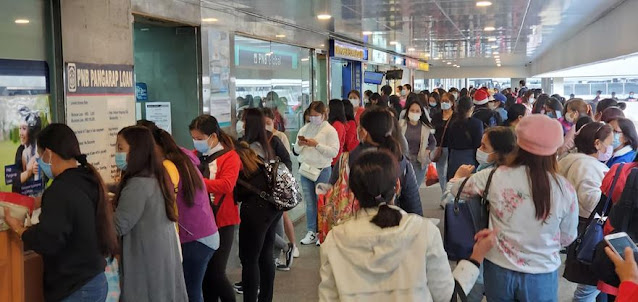by Daisy CL Mandap
 |
| DAB wants FDHs who get terminated to remain in HK for only 7 days |
Migrant support organizations have blasted
at a series of proposals issued Thursday by the biggest political party in Hong
Kong, the Democratic Alliance for the Betterment and Progress of Hong Kong
(DAB) which further curtails freedoms granted by law to foreign domestic
helpers.
Among the more controversial proposals in an
“executive summary” circulated by DAB is that which limits the stay of
terminated FDHs to 7, instead of 14 days, and another that requires them to pay
compensation for early termination, even if it is the employer who backs out of
the contract.
The proposals were said to have been
submitted to Chief Executive John Lee on August 30, with the hope that they
could be included in his Policy Address next month.
 |
| DAB members present their proposals to the media (HK01 photo) |
The Asian Migrants Coordinating Body
(AMCB), which is made up of various FDH groups comprising various nationalities,
blasted at what they called DAB’s “slave-like” proposals.
“The proposals include labelling all MDWs
who exercise their legal rights to terminate their contracts early as “job
hoppers, forcing them to “compensate their employers”, leave Hong Kong within
seven days and ban them (from) applying for another job in Hong Kong for two
years…are creating a slave-like class here in Hong Kong,” said the AMCB.
The reference to the two-year ban on
workers whose contracts were prematurely terminated is not in the executive
summary but was reportedly brought up by some DAB members who called a press
conference where only local media representatives were apparently notified.
According to reports from that press
conference, the DAB also wants FDHs who claim to have working experience to present
their previous employer’s “evaluation and certification letter” for
consideration by the new employer.
But even those who finish their two-year
contracts are not spared from DAB’s definition of job-hoppers. In its position
paper, the DAB says, “to combat job-hopping by FDHs, the contract shall ensure
that FDHs must return to their place of origin upon completion of the contract.”
It suggested that the standard employment
contract must provide that a FDH who takes up a new employment must produce a
valid air ticket in her name to prove that she had returned to her place of
origin before moving to the new employer.
DAB’s stern stance towards so-called “job
hoppers” or those who supposedly terminate their contracts on a whim, appears
rooted on their perception that FDHs have taken advantage of Immigration’s
decision to relax the 14-day rule for terminated workers amid travel
restrictions brought about by the pandemic.
Instead of seeing Immigration’s move as supporting
employers who needed to hire an FDH immediately amid Hong Kong’s extended
travel bans and other travel restrictions, DAB claims it gave FDHs the chance to move to
employers who could offer them higher pay.
Xiao Weizhong, a member of DAB’s family
affairs committee, cited the example of a FDH who reportedly quit her job after
just two months, then moved to another employer in the same housing estate for
a much higher pay.
But AMCB said allegations of job-hopping
are purely a myth.
“MDWs (migrant domestic workers) come to
Hong Kong to work and support their families back home. The process of getting
a visa is long, expensive and challenging. This is why even when their working
conditions are bad many MDWs will work to finish their contracts…” said their statement.
Contrary to DAB’s claim that the pandemic
allowed FDHs to job-hop to secure better-paying and easier jobs, the AMCB said the
crisis actually showed how vulnerable migrant workers are, as many were thrown
out of their employers’ houses or neglected after coming down with the
coronavirus.
“Yet no employers (have been) held
accountable,” said AMCB.
But, “infected or not, MDWs continue to
serve and care for Hong Kong families especially children and the elderly
throughout the pandemic. They should be respected, protected and recommended
for the care they give to vulnerable communities in Hong Kong.”
DAB’s “outrageous” proposals would leave
FDHs even more vulnerable, unable to protect themselves or stand up for their
basic rights, said AMCB.
 |
| AMCB leaders in one of their protests for better working conditions for MDWs |
Not all of DAB’s proposals were controversial,
however, and could be seen as actually beneficial to migrant workers if
implemented fairly, such as:
(1)
The establishment of a Foreign
Domestic Helpers Authority which will regulate the business practices of employment
agencies and oversee the processing of FDH contracts;
(2 (2) Requiring all registered EAs to
be accredited by the consulates of the sending countries
(3 (3)
Revise the Code of Practice for
EAs so the fees that they are allowed to charge are set out more clearly;
(4 (4) Establish a rating system for
EAs;
(5 (5) Regulate the boarding
facilities for FDHs;
(6 (6) Provide training courses for
FDHs and employers;
(7)
Limit the amount of loan that
FDHs can take from lending companies to no more than ice their monthly salary;
(8 (8) Set up an information website
specifically for employers and improve services for FDHs, like making the
Labour Department’s hotline available to them 24 hours a day, as well as a
one-stop online services that provide multi-language options;
( (9) Set up FDH centres across the
city, which will provide them a place for gathering and recreation on their
days off.
A key proposal is to provide tax breaks to employers for their expenses in
hiring FDHs, such as for medical examination in HK, mandatory training
courses in their home countries, and for “the total amount of salary paid to
FDHs.”





























